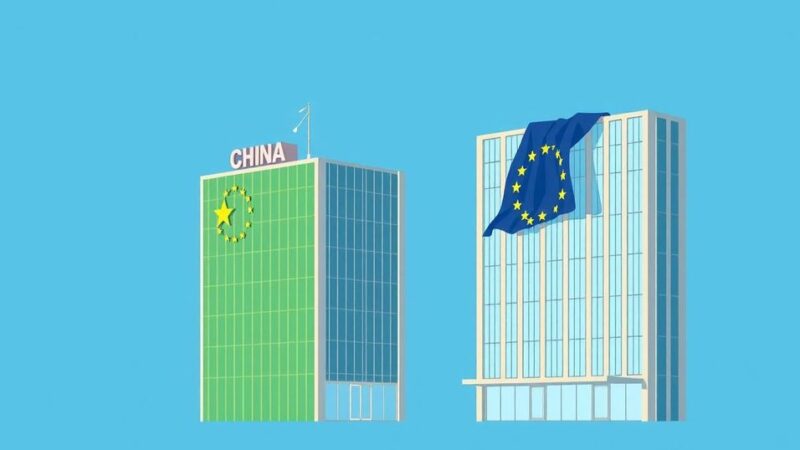The 2024 World Air Quality Report indicates high pollution levels in Ghana, Nigeria, Chad, and Rwanda, with Chad rated the most polluted globally at 91.8 µg/m³. Ghana ranks 14th with levels at 35.8 µg/m³. Key health impacts include respiratory diseases and a significant annual death toll due to pollution. Immediate governmental interventions are crucial to address rising pollution levels and their economic costs.
The 2024 World Air Quality Report reveals that several African nations, including Ghana, Nigeria, Chad, and Rwanda, are among the most polluted globally, indicating a serious public health issue. Chad leads with an alarming PM2.5 concentration of 91.8 µg/m³, significantly exceeding the World Health Organization’s (WHO) guideline. Nigeria, Rwanda, and Ghana follow with PM2.5 levels of 40.1, 40.8, and 35.8 µg/m³, respectively, highlighting a concerning degradation in air quality across the continent.
Particulate Matter (PM2.5) are tiny pollutants that infiltrate the lungs and bloodstream, causing severe health problems such as respiratory and cardiovascular diseases. These particles are markedly smaller than typical dust, making them a silent but dangerous contributor to global health crises. According to the University of Chicago’s data, pollution reduces lifespans by approximately 2.7 years in severely affected regions, with air pollution responsible for 8.1 million deaths globally in 2021 alone.
Ghana’s air quality concerns have intensified, with levels now seven times higher than WHO’s safe limit, placing it as the 14th most polluted country worldwide. The recent report highlights Kumasi, which has overtaken Accra as the most polluted city in Ghana, recording a PM2.5 of 39.5 µg/m³, surpassing Accra’s 36.3 µg/m³. Ghana’s PM2.5 levels have escalated from 30.2 µg/m³ in 2022 to a record 35.8 µg/m³ in 2024, necessitating urgent governmental action.
Africa’s air quality remains critically poor, with five out of the top ten most polluted countries situated on the continent. Limited monitoring capabilities hinder effective data collection, with only 24 of 54 African nations reporting air quality data. Alarmingly, 34% of African urban centers exceed the WHO PM2.5 standards by three to five times. Major cities like Lagos were excluded from the rankings due to insufficient data, underlining serious systemic gaps.
Public health implications are severe, with WHO estimating that air pollution causes 28,000 deaths annually in Ghana alone—approximately one every 19 minutes. If continued unchecked, air pollution could claim 2,333 lives monthly in the country. The economic repercussions are equally significant, as the Clean Air Fund projects that pollution could result in a loss of $137.8 billion to Ghana’s economy by 2040 if proactive measures are not adopted.
Globally, only 17% of cities meet the WHO air quality guidelines; contrastingly, certain nations maintain relatively clean air. For instance, in the 2024 rankings, the cleanest nations include Australia and New Zealand. South Africa’s Nieuwoudtville is noted as the only city in Africa to meet WHO air standards.
Driving factors behind the high pollution levels in Africa include rapid urbanization, industrial emissions, and poor waste management practices. Notably, the IQAir report highlights how NGOs have become significant contributors to air quality data, providing 67% of this information in Africa, indicating a substantial dependence on non-governmental efforts for monitoring pollution levels.
As Ghana’s air quality further deteriorates, increased pressure mounts on government officials to institute stricter environmental polices. Expert recommendations include implementing tougher vehicular emission standards, investing in renewable energy, enhancing air quality monitoring infrastructure, and enforcing regulations against burning practices to mitigate pollution impacts effectively. Immediate actions are essential to reverse this alarming trend before the health crisis intensifies further.
In summary, the 2024 World Air Quality Report paints a grim picture of air pollution in Africa, with countries like Ghana significantly affected. The rising PM2.5 levels signal an urgent public health dilemma, necessitating immediate and effective interventions. Without decisive action, the outlook for air quality and public health in these nations will continue to decline, reflecting a growing crisis that demands both local and global attention.
Original Source: www.myjoyonline.com






